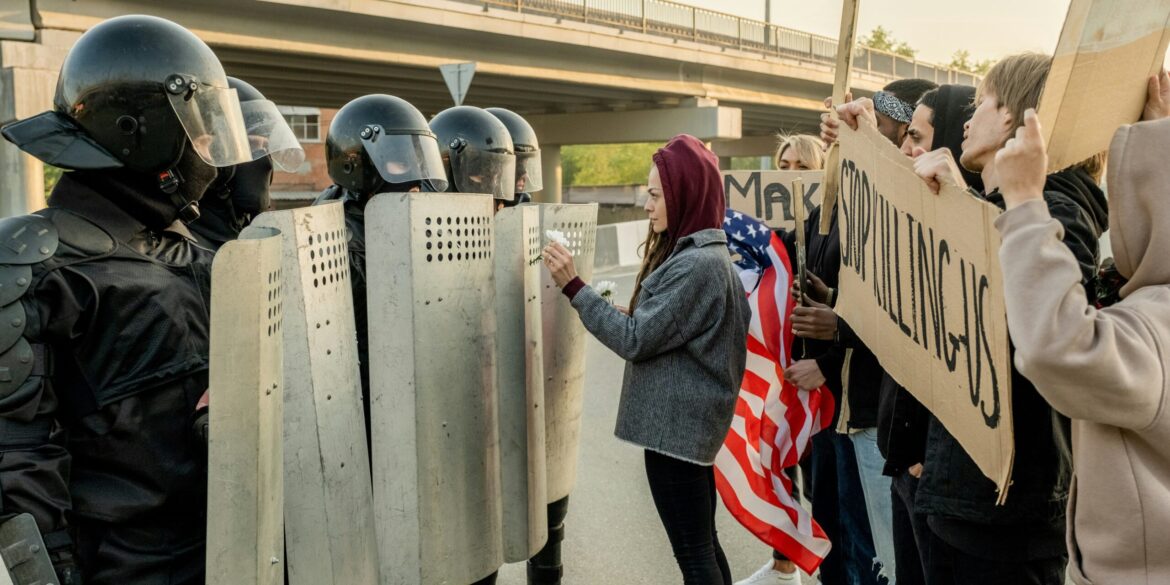On June 9, 2025, Los Angeles was rocked by widespread protests in response to aggressive immigration enforcement actions conducted by U.S. Immigration and Customs Enforcement (ICE). The demonstrations, initially peaceful, quickly escalated into intense confrontations between protesters, law enforcement, and military personnel, following the deployment of 2,000 National Guard troops and 700 U.S. Marines to the city. This show of force, ordered by the Trump administration, came as part of a broader crackdown targeting undocumented immigrants, particularly workers in the state’s agricultural and service sectors.
The protests were sparked by a series of coordinated ICE raids in Southern California, where agents targeted individuals suspected of living in the U.S. without legal authorization. The raids are part of a controversial policy that has seen increased immigration enforcement under the Trump administration, despite resistance from state and local governments. The demonstrations, which initially aimed to decry the raids and call for better treatment of immigrants, grew larger as the federal response became increasingly militarized.
Tensions reached a boiling point when the National Guard and Marines were deployed to reinforce the local law enforcement agencies tasked with maintaining order. Armed soldiers in full tactical gear were seen patrolling the streets and public areas in downtown Los Angeles, a move that many saw as an overreach by the federal government. The visible military presence prompted concerns about the militarization of domestic law enforcement, particularly in a city known for its progressive stance on immigration rights.
California Governor Gavin Newsom was quick to condemn the federal intervention, labeling it as unconstitutional and an abuse of power. In a statement made outside the state capitol, Newsom vowed to take legal action against the Trump administration, accusing it of violating California’s sovereignty and undermining local efforts to protect immigrant communities. “The Trump administration’s decision to send military forces into Los Angeles is an unprecedented step that seeks to intimidate and criminalize the undocumented residents who contribute to our state’s success,” Newsom said. “California will not stand idly by while the federal government violates our rights.”
The deployment of National Guard troops and Marines was seen as a direct response to the increasingly vocal opposition to ICE raids in liberal-leaning states like California. Proponents of the raids argue that such actions are necessary to uphold the rule of law and deter illegal immigration. However, critics contend that they disproportionately target vulnerable communities, often separating families and instilling fear in immigrant neighborhoods. These concerns have been exacerbated by reports of aggressive tactics used by ICE agents, including indiscriminate arrests and the use of force in some instances.
As the protests intensified, demonstrators clashed with law enforcement. Several individuals were arrested, and there were reports of injuries from both protesters and police officers. The Los Angeles Police Department (LAPD) attempted to disperse the crowds using non-lethal force, including rubber bullets and tear gas, which only served to further inflame tensions. The city’s mayor, Eric Garcetti, urged both sides to exercise restraint, but his calls for calm were largely ignored as protests continued into the night.
The situation in Los Angeles is a microcosm of the larger national debate over immigration policy and federal-state relations. In recent years, immigration enforcement has become one of the most divisive issues in American politics. While the Trump administration has focused on a hardline stance against illegal immigration, many states and cities, particularly those with large immigrant populations, have sought to distance themselves from federal enforcement actions. California, in particular, has become a battleground in this ideological war, with its sanctuary laws and resistance to federal mandates drawing both praise and criticism.
The use of military personnel to assist in domestic law enforcement operations is also raising alarms among civil rights groups, who argue that such actions undermine democratic principles and civilian oversight. The ACLU, along with several other advocacy groups, has condemned the military’s role in policing protests and immigration raids, calling it a dangerous precedent for future federal overreach.
The ongoing unrest in Los Angeles is likely to have significant implications for the upcoming presidential election. Immigration policy remains a key issue in the race, and President Trump’s handling of the situation could resonate with voters across the country. While his supporters may view the raids and military intervention as necessary to restore order, critics are likely to see it as an infringement on personal freedoms and an escalation of the nation’s divisive immigration rhetoric.
As protests continue to unfold in Los Angeles, the situation remains fluid. The legal battles between the state of California and the federal government are expected to intensify, and the future of immigration enforcement will likely remain a contentious issue at both the state and national levels.

